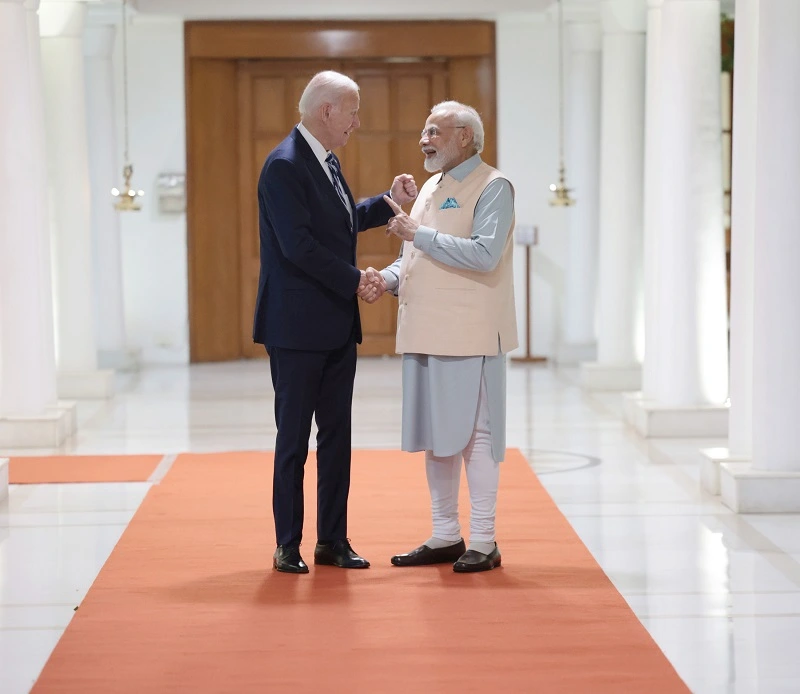

Prime Minister Narendra Modi with the US President Joe Biden in New Delhi on Friday (All images courtesy: PIB)
Welcoming the sustained momentum in bilateral cooperation, Prime Minister Narendra Modi and the US President Joe Biden have reaffirmed their commitment to deepen and diversify the India-US Major Defence Partnership through expanded cooperation in new and emerging domains such as space and AI, and accelerated defence industrial collaboration.
At the same time, Washington has welcomed the issuance of a Letter of Request from the Ministry of Defence of India to procure 31 General Atomics MQ-9B (16 Sky Guardian and 15 Sea Guardian) remotely piloted aircraft and their associated equipment, which will enhance the intelligence, surveillance and reconnaissance (ISR) capabilities of India’s armed forces across all domains.
Biden, who is visiting India for the first time in his capacity as President, proceeded directly from airport to Lok Kalyan Marg Friday evening to hold bilateral talks with PM Modi ahead of Saturday’s G20 Summit in New Delhi.
The two leaders began the highly-anticipated meeting by commending the progress in implementing the futuristic and wide-ranging outcomes of PM Modi’s landmark State visit to the US in June, including under the India-US Initiative for Critical and Emerging Technology (iCET).
“Prime Minister conveyed his appreciation for President Biden’s vision and commitment to further strengthen the India-US Comprehensive Global Strategic Partnership, which is based on shared democratic values, strategic convergences and strong people-to-people ties,” the Prime Minister’s Office (PMO) said in a statement after the meeting.
The US President, who lauded India’s G20 Presidency for further demonstrating how the G20 as a forum is delivering important outcomes, also congratulated PM Modi and the people of India on Chandrayaan-3’s historic landing near the lunar south pole as well as the successful launch of India’s first solar mission, Aditya-L1.
“Great seeing you, Mr. Prime Minister. Today, and throughout the G20, we’ll affirm that the United States-India partnership is stronger, closer, and more dynamic than any time in history,” tweeted Biden.
Exchanging views on a number of regional and global issues, both leaders agreed that the India-US partnership was beneficial not only for the people of the two countries but also for global good.
In a joint statement released later, the leaders called on their governments to continue the work of transforming the India-US Strategic Partnership across all dimensions of multifaceted global agenda, based on trust and mutual understanding.
It mentioned that both countries will continue to build resilient technology value chains and link defence industrial ecosystems promote policies and adapt regulations that facilitate greater technology sharing, co-development, and co-production opportunities between Indian and US industry, government and academic institutions.
Both leaders also commended the India-US Defence Acceleration Ecosystem (INDUS-X) team for establishing a robust collaboration agenda to harness the innovative work of the Indian and US defence sectors to address shared security challenges. They welcomed the announcement by the Indian Ministry of Defence’s Innovations for Defence Excellence and the US Department of Defence’s Defence Innovation Unit to launch two joint challenges, which will invite start-ups to develop solutions to shared defence technology challenges.
Continuing to share the view that global governance must be more inclusive and representative, Biden reaffirmed his support for a reformed UN Security Council with India as a permanent member, and, in this context, welcomed once again India’s candidature for the UNSC non-permanent seat in 2028-29.
Having set a course to reach new frontiers across all sectors of space cooperation, both PM Modi and Biden vowed to deepen cooperation between the two countries in Space.
This includes more joint projects in outer space exploration and establishment of a Working Group for commercial space collaboration under the existing India-US Civil Space Joint Working Group.
Indian Space Research Organisation (ISRO) and the National Aeronautics and Space Administration (NASA) have already commenced discussions on modalities, capacity building, and training for mounting a joint effort to the International Space Station in 2024, and are continuing efforts to finalise a strategic framework for human space flight cooperation by the end of 2023.
India and the United States also intend to increase coordination on planetary defence to protect planet Earth and space assets from the impact of asteroids and near-Earth objects, including US support for India’s participation in asteroid detection and tracking via the Minor Planet Centre.
The leaders also reiterated their support for building resilient global semiconductor supply chains, noting in this respect a multi-year initiative of Microchip Technology, Inc., to invest approximately US$300 million in expanding its research and development presence in India and Advanced Micro Device’s announcement to invest US$400 million in India over the next five years to expand research, development, and engineering operations in India.
As they reaffirmed the importance of the Quad in supporting a free, open, inclusive, and resilient Indo-Pacific, PM Modi said that he will look forward to welcoming Biden to the next Quad Leaders’ Summit to be hosted by India in 2024.
Also Read: US President Joe Biden arrives in New Delhi, stage set for a G-20 to define a post-Covid world order
BRICS Sherpa Secretary (ER) Dammu Ravi participated in the BRICS Sherpas Meeting being held in…
The Border Security Force (BSF) Director General Daljit Chawdhary on Friday met with Union Home…
By Shailesh Yadav Google Gemini, the generative artificial intelligence tool of technology major Google, can…
Union Home Minister Amit Shah spoke with Chief Ministers on Friday and asked them to…
Raja Abid, Chairman of the Revolutionary Students Organisation, has condemned the deteriorating education system in…
Tibetans-in-exile in Shimla observed the 36th birthday of the 11th Panchen Lama, Gendhun Choekyi Nyima,…